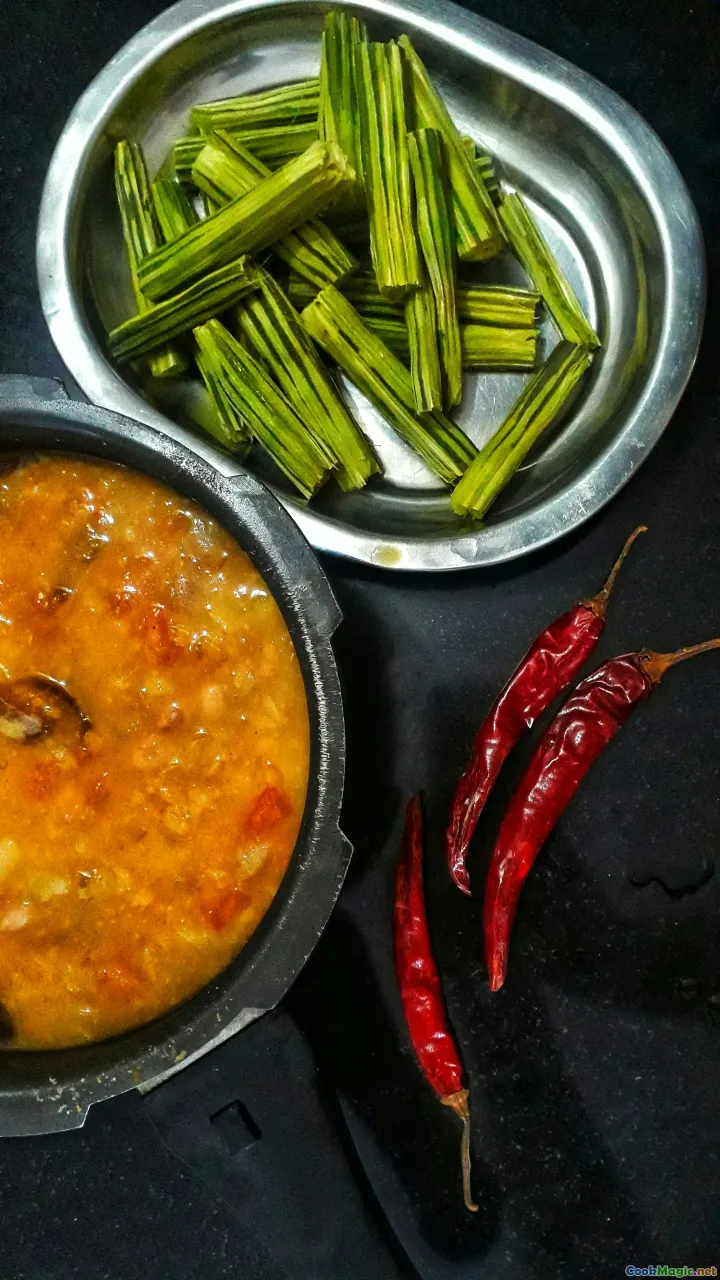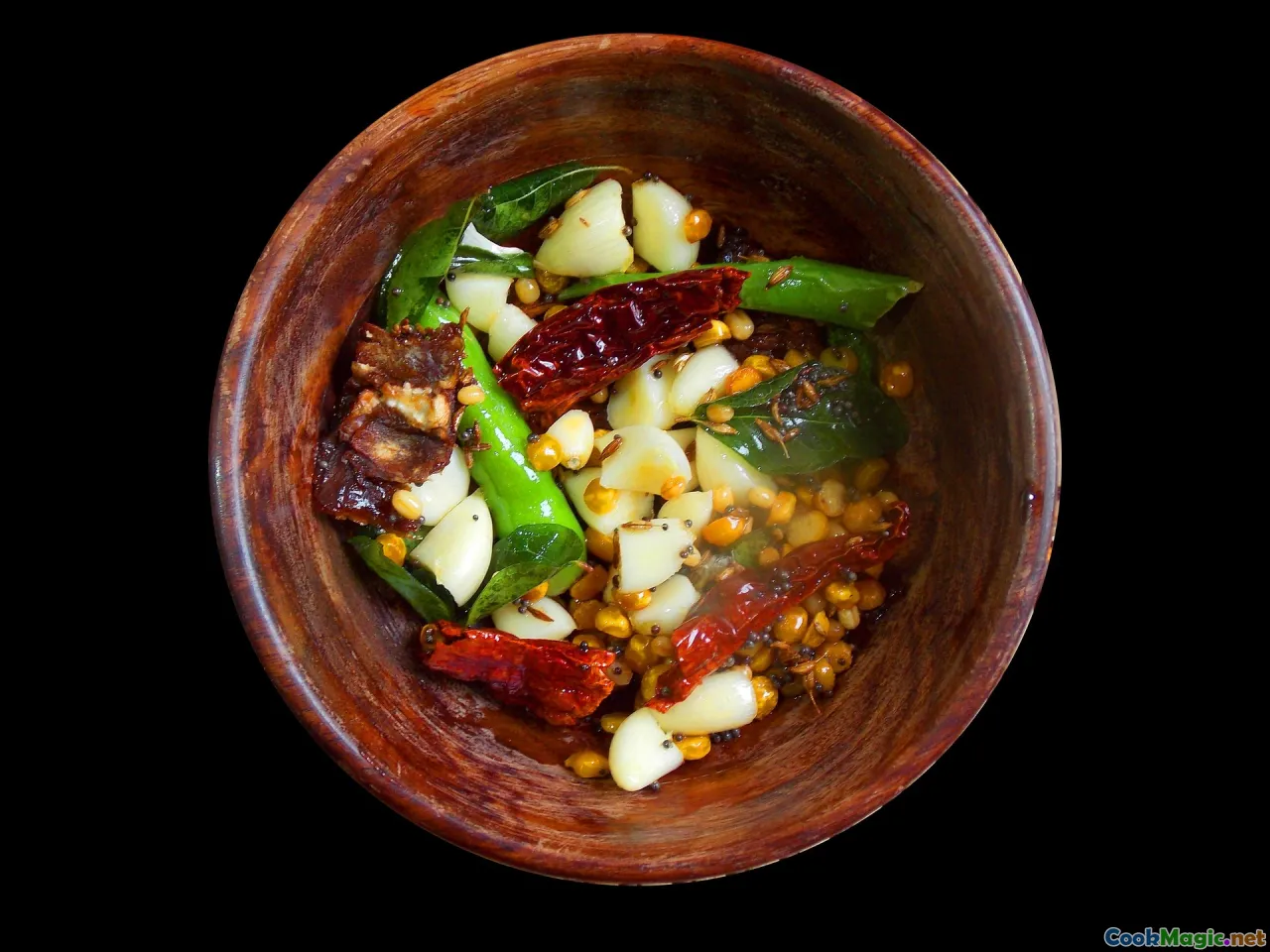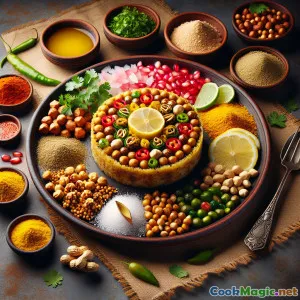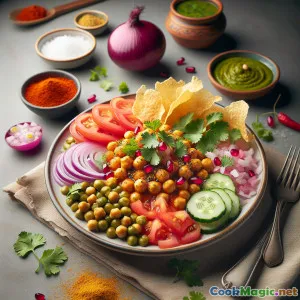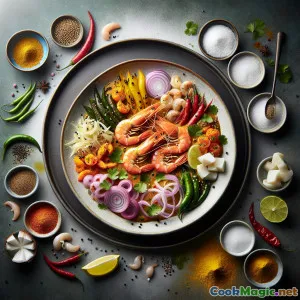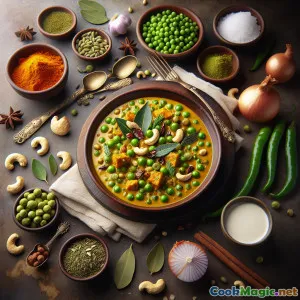
لحن كاري سمك Rui: كاري Rohu مع الخردل
(Rui Maacher Torkari Melody: Rohu Mustard Curry)
(0 المراجعات)المكونات
-
800 grams شرائح سمك روهو (روي)، بالعظام
(4–6 steaks, skin on, fresh river carp preferred)
-
1.5 tsp مسحوق الكركم
(Divided for marinade and gravy)
-
1.5 tsp ملح كوشير
(اضبط حسب الذوق)
-
5 tbsp زيت الخردل
(4 tbsp for frying + 1 tbsp to finish)
-
0.5 tbsp بذور الخردل الأسود
(Soak and grind for paste; reduces bitterness when mixed with yellow)
-
1.5 tbsp بذور الخردل الصفراء
(Soak in warm salted water 15 minutes before grinding)
-
3 pieces الفلفل الأخضر
(2 for paste, 1 slit for tempering)
-
0.5 tsp بذور الحبة السوداء (كالونجي)
(Classic Bengali tempering)
-
1 small بصل مقطع شرائح رقيقة
(Traditional homes may skip onions; adds sweetness)
-
1 medium طماطم مفرومة
(Balances mustard sharpness)
-
1 tsp بودرة الكمون
(Earthy base note)
-
1 tsp مسحوق الكزبرة
(Optional herbal lift)
-
1 tsp بودرة الفلفل الأحمر الكشميري
(Color and gentle warmth)
-
1 medium بطاطا مقشرة ومقطّمة إلى مثلثات
(Adds homestyle heft)
-
200 grams باذنجان (brinjal)、شرائح مثلثة
(Soaks up the gravy beautifully)
-
400 ml ماء ساخن
(For gravy; adjust for desired thickness)
-
0.5 tsp سكر
(Balances bitterness of mustard)
-
2 tbsp أوراق الكزبرة الطازجة
(مفروم، للتزيين)
-
1 tsp عصير الليمون
(Bright finish at the end)
(4–6 steaks, skin on, fresh river carp preferred)
(Divided for marinade and gravy)
(اضبط حسب الذوق)
(4 tbsp for frying + 1 tbsp to finish)
(Soak and grind for paste; reduces bitterness when mixed with yellow)
(Soak in warm salted water 15 minutes before grinding)
(2 for paste, 1 slit for tempering)
(Classic Bengali tempering)
(Traditional homes may skip onions; adds sweetness)
(Balances mustard sharpness)
(Earthy base note)
(Optional herbal lift)
(Color and gentle warmth)
(Adds homestyle heft)
(Soaks up the gravy beautifully)
(For gravy; adjust for desired thickness)
(Balances bitterness of mustard)
(مفروم، للتزيين)
(Bright finish at the end)
التغذية
- الحصص: 4
- حجم الحصة: 1 وعاء (300غ)
- Calories: 500 kcal
- Carbohydrates: 12 g
- Protein: 34 g
- Fat: 25 g
- Fiber: 3 g
- Sugar: 4 g
- Sodium: 700 mg
- Cholesterol: 95 mg
- Calcium: 120 mg
- Iron: 2.6 mg
التعليمات
-
1 - Marinate the Fish:
Pat dry the rohu steaks. Rub with 1 tsp turmeric and 1 tsp salt. Set aside for 10 minutes to firm the flesh and season through.
-
2 - Make mustard-chili paste:
Soak yellow and black mustard seeds in warm salted water for 10–15 minutes. Drain. Grind with 2 green chilies and a splash of hot water to a smooth, pale paste. Do not overblend to avoid bitterness.
-
3 - Sear the Fish:
Heat 4 tbsp mustard oil until just smoking, then lower heat. Lightly sear marinated rohu steaks 1–2 minutes per side until lightly golden. Remove to a plate.
-
4 - Fry vegetables:
In the same oil, fry potato and eggplant wedges with a pinch of salt until lightly browned. Remove and reserve.
-
5 - Temper aromatics:
Lower heat. Add nigella seeds and 1 slit green chili to the oil. When fragrant, add sliced onion (if using) and sauté until translucent.
-
6 - Build the Masala:
Add chopped tomato, remaining 0.5 tsp turmeric, cumin powder, coriander powder (if using), and Kashmiri chili. Cook until tomato breaks down and masala releases oil.
-
7 - Bloom the mustard paste:
Reduce heat to low. Stir in the mustard-chili paste and sugar. Cook gently 2–3 minutes, adding splashes of hot water to keep it from catching. Avoid high heat to prevent bitterness.
-
8 - Form the gravy:
Pour in 400 ml hot water. Bring to a lively simmer. Return fried potato and eggplant; cook until just tender and the gravy slightly thickens.
-
9 - Finish with Fish:
Slide in the seared fish steaks. Simmer gently 4–6 minutes, spooning gravy over the fish. Adjust salt. Finish with 1 tbsp raw mustard oil and lemon juice.
-
10 - Rest and Serve:
Let the curry rest 3–5 minutes. Garnish with coriander leaves. Serve hot with steamed rice.
Pat dry the rohu steaks. Rub with 1 tsp turmeric and 1 tsp salt. Set aside for 10 minutes to firm the flesh and season through.
Soak yellow and black mustard seeds in warm salted water for 10–15 minutes. Drain. Grind with 2 green chilies and a splash of hot water to a smooth, pale paste. Do not overblend to avoid bitterness.
Heat 4 tbsp mustard oil until just smoking, then lower heat. Lightly sear marinated rohu steaks 1–2 minutes per side until lightly golden. Remove to a plate.
In the same oil, fry potato and eggplant wedges with a pinch of salt until lightly browned. Remove and reserve.
Lower heat. Add nigella seeds and 1 slit green chili to the oil. When fragrant, add sliced onion (if using) and sauté until translucent.
Add chopped tomato, remaining 0.5 tsp turmeric, cumin powder, coriander powder (if using), and Kashmiri chili. Cook until tomato breaks down and masala releases oil.
Reduce heat to low. Stir in the mustard-chili paste and sugar. Cook gently 2–3 minutes, adding splashes of hot water to keep it from catching. Avoid high heat to prevent bitterness.
Pour in 400 ml hot water. Bring to a lively simmer. Return fried potato and eggplant; cook until just tender and the gravy slightly thickens.
Slide in the seared fish steaks. Simmer gently 4–6 minutes, spooning gravy over the fish. Adjust salt. Finish with 1 tbsp raw mustard oil and lemon juice.
Let the curry rest 3–5 minutes. Garnish with coriander leaves. Serve hot with steamed rice.
المزيد عن : لحن كاري سمك Rui: كاري Rohu مع الخردل
Rui Maacher Torkari Melody
This dish is a lyrical ode to Bengali home kitchens—where fresh river fish, bold mustard, and tempered spices come together in a bright, balanced curry that sings beside a mound of steaming rice. Rui maach (rohu) holds a special place in Bengali hearts, and when paired with an assertive mustard profile, the result is both nostalgic and exciting. Torkari means curry, but in Bengal, it implies a careful coaxing of flavors—never muddy, always harmonious.
What Makes This Curry Sing
- Mustard oil and mustard paste provide the signature bite and aroma, tempered by tomato’s gentle sweetness and the soft, silky texture of fried eggplant.
- Nigella seeds (kalonji) add that instantly recognizable Bengali perfume, while Kashmiri red chili powder lends a festive color without overwhelming heat.
- A light sear on the rohu pieces keeps the delicate flesh intact and infuses the oil with fish flavors that enrich the gravy.
Ingredient Spotlight
- Rohu (Rui): A freshwater carp cherished across Bengal. Its bone-in steaks deliver flavor and texture that hold up in a gravy.
- Mustard: A blend of yellow and a smaller portion of black mustard keeps the paste aromatic but less bitter. Soaking and gentle cooking are crucial.
- Nigella Seeds: Classic tempering that whispers of riverine kitchens and family lunches on lazy afternoons.
- Vegetables: Potatoes and eggplant are common additions, stretching the dish and absorbing the gravy’s essence.
Technique Tips for a Perfect Melody
- Tame the mustard: Soak the seeds in warm salted water, then grind smoothly with green chili. Cook on low heat—boiling or aggressive frying can turn the paste bitter.
- Heat the mustard oil properly: Bring it to the smoking point briefly, then cool slightly. This mellows the raw pungency but keeps its signature aroma.
- Sear, don’t overcook: Fish should be lightly sealed, not fully cooked during the fry. The final simmer in gravy completes the cooking and keeps it tender.
- Build layers: First the tempering, then the masala, then the mustard paste, and finally the hot water. Each layer contributes to the melody.
- Balance is key: A pinch of sugar and tomato’s natural acidity help round the mustard’s edges; a final drizzle of raw mustard oil brings the high notes back.
Serving and Pairings
Serve Rui Maacher Torkari with plain steamed rice—preferably a fragrant short-grain like Gobindobhog, though any steamed rice works beautifully. Keep sides simple: a wedge of lime, a light cucumber-onion salad, or a quick sautéed leafy green. Avoid heavy breads; this curry’s flow favors rice.
Variations and Substitutions
- Fish: If you can’t find rohu, try catla, tilapia steaks, or even salmon. For boneless ease, use thick cod loins but adjust simmering time.
- Mustard: If mustard seeds are scarce, a good-quality mustard powder paste can work. Add a splash of vinegar and a bit of turmeric for color.
- Vegetables: Skip the onion for a no-onion, no-garlic traditional style. Add cauliflower florets in winter or ridge gourd in summer.
- Spice tempering: Replace nigella with panch phoron for a more pronounced Bengali spice chorus.
Cultural Notes
In Bengal, fish is more than sustenance—it’s identity, ritual, and emotion. Rui maach is a hallmark of festive and everyday meals alike, versatile and loved by generations. Mustard oil’s peppery nose evokes monsoon afternoons and family gatherings. The curry’s architecture—tempering, masala, and a careful mustard crescendo—is a distillation of regional wisdom that prizes clarity over heaviness.
Make-Ahead, Storage, and Leftovers
- Advance prep: Grind the mustard paste up to 1 hour ahead. Longer rests may intensify bitterness. Marinate fish for 10–20 minutes only.
- Storage: Refrigerate leftovers in a glass container for up to 2 days. Reheat gently; avoid boiling, which can tighten fish and dull mustard’s nuance.
- Leftover magic: The gravy deepens overnight—excellent with fresh rice or even a light khichuri.
Troubleshooting
- Bitter gravy? You likely overblended or overheated the mustard paste. Next time, soak longer, blend shorter, and keep heat low. A pinch of sugar and squeeze of lemon can help recover.
- Fish breaking? Sear a touch longer and avoid vigorous stirring. Use a wide pan so pieces don’t crowd.
- Too sharp? Add a splash more hot water and simmer briefly to mellow. Tomato and eggplant also soften edges.
Final Thoughts
Rui Maacher Torkari Melody is a study in balance—sharp yet soft, bold yet comforting. Mastering its simple steps teaches you the essence of Bengali cooking: respect for the ingredient, restraint in heat, and patience in building layers. Once you hear the “melody” of mustard, nigella, and fresh river fish in harmony, you’ll crave its chorus again and again.


